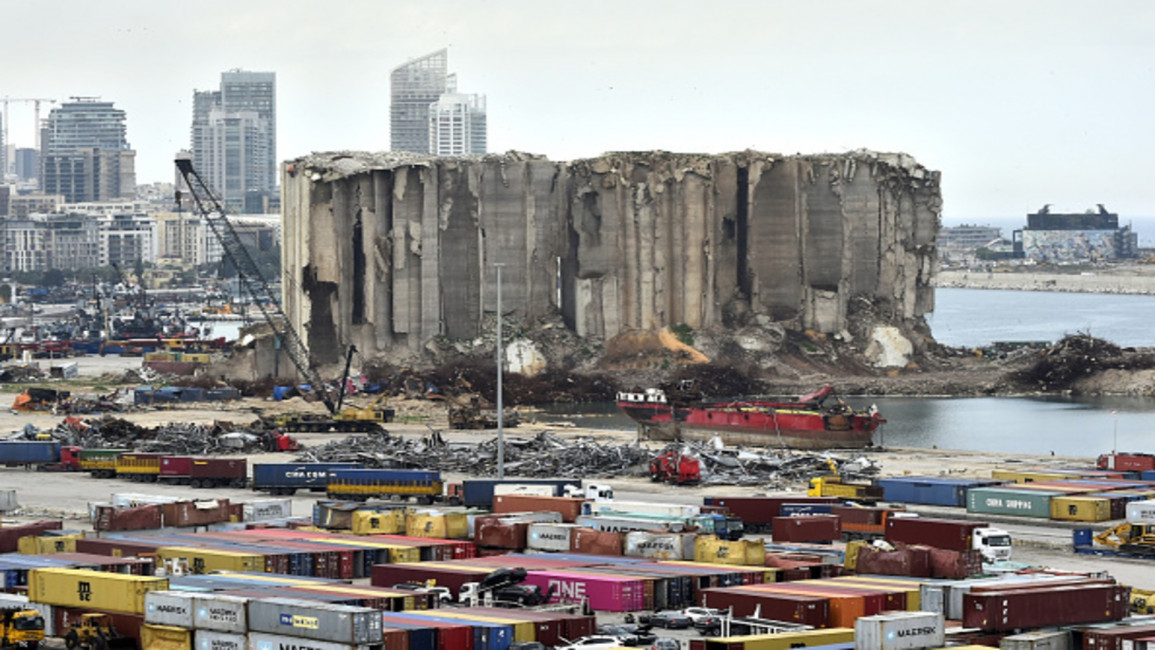Palestinian architects put forward bold plan for Beirut port reconstruction
A quartet of Palestinian architects have reimagined Beirut's port, which was razed by large amounts of ammonium nitrate on August 4, in a bold prize-winning architectural project.
The Phoenix Prize was launched last November as an international forum to reinvent the landmark and present a new vision for the Lebanese capital.
It was awarded to a four-person team from the West Bank for their project "The Aftermath—A Productive Beirut", which reimagined the site as an economically self-sustaining public park and market, open to the city it was once sealed off from.
The silos that shielded Beirut from the full force of the blast are at the centre of the redesign, connecting a self-contained industrial area on the eastern side to a public-oriented western side.
The latter section includes a "Silo Souk", designed using one remaining row of structurally sound silos as a bridge to a new souk, or marketplace. The flexible prefab structures are manufactured from steel and converted detritus —bits of glass, wood, steel, iron, and rubble - recovered from the explosion.
One of the main themes of the proposed Beirut port regeneration scheme is shifting the port's reliance on imports to local production, be it for local produce or for building material.
The renovated space aims to be used by Beirut's artisans to sell produce from educational urban farms, offer workshops and host educational projects. The space includes a circular concrete amphitheatre, intended for performances and public gatherings where "the public can have their say".
The 226,000-square-foot area is buffered by native trees and vegetation and is entirely pedestrian, with a series of green pathways leading to the amphitheatre.
The same prefab structures comprising the Silo Souk were designed to double as temporary housing to accommodate some among the 300,000 people made homeless by the explosion.
Alaa Abu Awad, Mais Bani Odeh, Majd Al-Malki and Diala Andonia presented what was dubbed a "people's park", according to the American monthly magazine Architectural Digest.
They were awarded top prize over second- and third- place Russian and Italian teams and other global entries by a jury of international architects.
Footage from the massive explosion in Beirut Port, Lebanon pic.twitter.com/bdvzrS05Qf
— Beirut Today (@bey_today) August 4, 2020
The Phoenix Prize, which takes its name from the legend that sees Beirut being rebuilt from its ashes multiple times like the firebird, is part of the Haifa Awards International Program run by IDAR-Jerusalem, a non-profit association of Palestinian architects and engineers promoting innovative design solutions for "cities at risk".
The award program was launched four days after the port explosion destroyed much of the site and causing at least 207 deaths and 7,500 injuries.
"We noticed that Beirutis complained on social media saying 'We don’t need another monument. We need food, housing, jobs—not just something to look at'," Al-Malki told Architectural Digest.
Beirut's port provided 60 percent of Lebanon’s imports. Its destruction exacerbated food shortages, unemployment, and economic hardship.


![Minnesota Tim Walz is working to court Muslim voters. [Getty]](/sites/default/files/styles/image_684x385/public/2169747529.jpeg?h=a5f2f23a&itok=b63Wif2V)




![Debris near Rafic Hariri International Airport [Getty]](/sites/default/files/styles/image_212x120/public/2176162423.jpeg?h=a5f2f23a&itok=XLiO6WHk)
![An Israeli air strike on Jabalia killed teenage journalist Hassan Hamad [Screengrab/X]](/sites/default/files/styles/image_330x185/public/2024-10/hassan%20hamad1.jpg?h=c12e0b96&itok=Rd_dyCVp)
